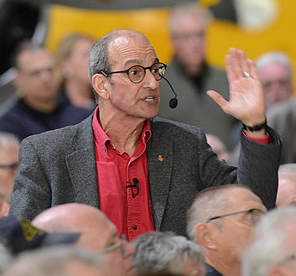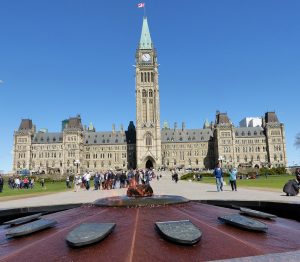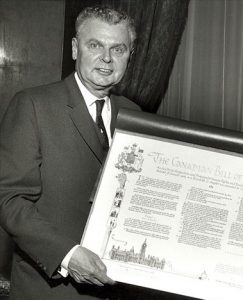
I’d just finished one of my military history talks, this particular night. I had fielded a number of specific questions about the women and men I’d featured in my presentation. And one of the younger members of the audience put up his hand and asked the toughest question of the night.
“Your books are all about people fighting for freedom,” the young man said. “What does freedom mean to you?”
I asked him if I could collect my thoughts a second. He nodded. And I thought about the thousands of servicemen and women I’ve interviewed over 50 years as a journalist, broadcaster and historian. I thought about the causes some of those veterans have espoused – against fascism and the Holocaust in the Second World War or for the United Nations Charter in Korea or Kosovo.
I considered some of our own symbols of freedom – municipal councils, election ballot boxes, multilingual education, uncensored libraries, religious freedom and reconciliation with Indigenous neighbours. And I thought about my profession – as freelance writer – able to research and report news events or to express my opinion in thousands of Barris Beat editorials.
But then an indelible image of freedom came to me. And I answered the question.

“Freedom is our Parliament,” I said. “I’ve visited it in Ottawa, lobbied inside MPs’ offices there, researched in its library and sat in its public gallery to watch the nation’s legislation debated and passed into law.”
For the past two weeks, however, I have watched that symbol of freedom assaulted by what amounts to a rudderless mob claiming to represent the majority of truckers not in favour of vaccination mandates. (The truth is 90 per cent of Canadian truckers are vaccinated.)
I’ve watched the mob – from a distance – clog the streets of the national capital with idling vehicles, pop-up food shacks and jerry-can fuel brigades. They’ve filled the streets with pointless honking, engine exhaust, chants of insurrection and juvenile street parties parading their ill-founded demands with racist symbolism, placard illiteracy and populist rhetoric calling for the overthrow of a freely elected federal government.
And they’ve done it all while blocking our (and many of our democratically elected Members of Parliament) access to that vital symbol of freedom, the House of Commons.
Over last weekend, Jim Watson, the mayor of Ottawa, declared a state of emergency, suggesting that things were “out of control.” Peter Sloly, the city’s police chief, claimed the National Capital was “under siege.” I call those assessments underestimations. I’m more inclined to view this occupation much the way Mark Carney, the former governor of the Banks of Canada and England, does.
“In our capital city, many people have been terrorized. Women fleeing abuse have been harassed. Elderly have been too afraid to venture outside their homes,” he wrote this week in the Globe and Mail.
Quite correctly, he outs the leadership of the so-called “freedom convoy” for attempting to remove from office a government that Canadians elected democratically half a year ago. He worries that we’ve all dismissed “their blatant treachery” as comic, and that authorities have not taken this “insurrection” seriously enough.
Carney calls for the police to ferret out those extending the occupation of the city to be identified and punished to the fullest extent of the law.
“No one should have any doubt,” about the intentions of those occupying Ottawa, he wrote. “This is sedition.”
For any people who suggest we don’t give those in opposition a fair hearing in times of dissent and upheaval, I’m reminded of an audience I received as a young journalist and broadcaster. Thanks to a friend in Saskatchewan, in the early 1970s, I gained an audience with John George Diefenbaker, the former prime minister. I enjoyed a half-hour interview with a favourite Saskatchewan son, sometimes called a Western Canadian populist, who led this country from 1957 to 1963.

Mr. Diefenbaker shared with me some of his experiences as a lawyer, MP and prime minister. Among many achievements, he helped craft and pass the Canadian Bill of Rights, which became federal law on July 1, 1960. And he recited for me the preamble to the Bill, which as a lifelong Conservative, he composed:
“I am a Canadian, a free Canadian, free to speak without fear, free to worship God in my own way, free to stand for what I think is right, free to oppose what I believe wrong, free to choose those who shall govern my country. This heritage of freedom I pledge to uphold.”
Those calling for a brand of freedom that tears all that down, would do well to read the Bill of Rights that a populist Conservative prime minister from Western Canada helped create democratically.
I fear there is a concerted effort from beyond our borders to destroy our liberal democracy. It is happening elsewhere too, and there is something insidious, well-financed, and well-networked underlying it all. I fear for Canada, and for the world. Something wicked this way comes…